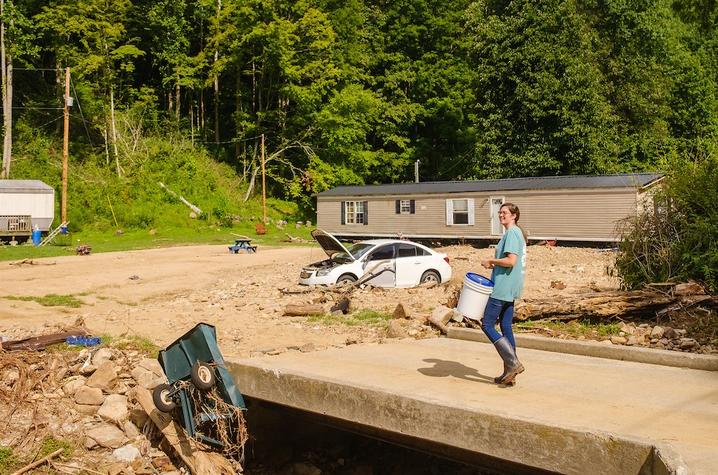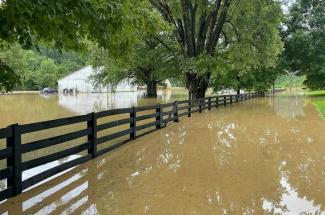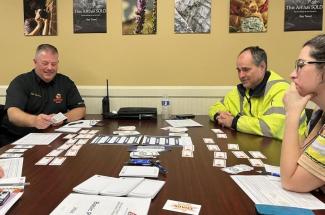UK Extension launches strike teams — a new response and recovery initiative to weather disasters

Kentuckians have experienced several recent weather-related disasters, causing significant damage to infrastructure and communities across the state.
“Kentucky has experienced an increase in ‘billion dollar’ weather disasters — a total of 92 impacting the area since 1980, with seven of those devastating events occurring in 2024 alone,” said University of Kentucky senior meteorologist Matt Dixon.
Kayla Watts, who was previously a UK Extension agent in Breathitt County, remembers watching the North Fork Kentucky River in Jackson, Kentucky, in 2022 continue to rise as the flooding began to make its way into town.
“It looked like a wall of water — it was scary because we didn’t know how high it would get, and parts of town were evacuated due to the rising river water,” said Watts, now a UK Area Extension director. “Many folks said that they didn’t have time to get their possessions. Everything was just gone. We just weren’t prepared for something like this.”
Along with ongoing damage caused by recent storms this year in Kentucky, this sparked Watts and other extension leaders to begin assessing local and statewide needs to determine what communities and individuals needed to better prepare, respond and recover.
Kentucky Extension Disaster Education Network is formed
The UK Cooperative Extension Service at the Martin-Gatton College of Agriculture, Food and Environment (CAFE), in collaboration with Kentucky State University, has launched a new initiative to help advance the state’s disaster preparedness and recovery capabilities — developing strike teams to better respond and reduce the impact of disasters through research-based education.
Made possible through a partnership and grant from the Extension Disaster Education Network (EDEN), this initiative is helping address the pressing need for a more coordinated and effective disaster response in Kentucky and beyond.
“This initiative will allow Extension leaders to learn from established strike team models and, crucially, implement a pilot strike team program within Kentucky Cooperative Extension,” said Jeff Young, Kentucky EDEN project team leader and Director of Urban Extension at Martin-Gatton CAFE. “Furthermore, the development of a national toolkit provides a roadmap for other states to build their own resilient disaster response networks.”
These specialized strike teams, composed of trained county agents and staff in Kentucky, will provide crucial on-the-ground support to communities impacted by disasters.
Watts, who worked with Young in writing the EDEN grant proposal and is one of the approximately 40 strike team members in Kentucky, believes that organization is key.
“Many people want to help, but it must be streamlined,” Watts said. “These strike teams are a ready-made, trained group who are ready to help and provide relief. As a strike team member, you are working in coordination with your county’s emergency plan. In our trainings, we are now stressing the importance of preparedness, support and recovery.”
Kentucky strike team member Danielle Hagler, Nelson County Cooperative Extension agent for UK Family and Consumer Sciences, adds that collaboration and working with community leaders is essential.
“Our extension agents that are strike team members all have different passions, skills and talents. Based on everyone’s area of expertise, we can all help each other in areas where we need support,” Hagler said. “Working with our city officials, first responders and emergency management is also crucial to be better prepared and organized. We all must work together.”
Kentucky EDEN is a collaborative multi-state effort supported by the U.S. Department of Agriculture National Institute of Food and Agriculture and Cooperative Extension Services across the country to reduce the impact of disasters through research-based education. Kentucky Emergency Management and the Kentucky Department of Public Health are also collaborative partners with the Kentucky EDEN project team.
Visit https://anr.ca.uky.edu/extensionhelps to learn more about the Kentucky EDEN initiative, along with education resources in disaster recovery and preparedness.
To learn more about the UK Cooperative Extension Service programs, visit https://extension.ca.uky.edu or contact your local County Extension Office.
This material is based upon work that is supported by the National Institute of Food and Agriculture, U.S. Department of Agriculture, under agreement number 2023-37623-40794. Any opinions, findings, conclusions or recommendations expressed in this publication are those of the author(s) and do not necessarily reflect the view of the Department of Agriculture.
About EDEN
EDEN is a collaborative network of Cooperative Extension educators across the United States and territories who work to improve the delivery of education and information and the availability of resources related to disaster preparedness, response and recovery. Historically, this grassroots network has been aligned with the Extension Committee on Organization and Policy and supported by USDA NIFA through the Food and Agricultural Defense Initiative (FADI) grant.
EDEN continues to grow programming and service to populations served by 1890 land-grant institutions, Native American tribal councils and populations served by 1994 land-grant institutions, and Hispanic Serving Institutions.
The Extension Foundation, in partnership with Washington State University and the Cooperative Extension System, supports the administration of the FADI-EDEN project. Learn more about EDEN at https://extensiondisaster.net.




